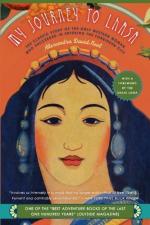
|
| Name: _________________________ | Period: ___________________ |
This test consists of 15 multiple choice questions and 5 short answer questions.
Multiple Choice Questions
1. What did David-Neel view 1912 as a time of in Tibet?
(a) Religious instability.
(b) Cultural instability.
(c) Military instabilityl.
(d) Political instability.
2. Yongden was stopped by a pilgrim group who sought his aid for which of their members whose legs they believed hurt due to a demon?
(a) A woman.
(b) A man.
(c) A girl.
(d) A boy.
3. What would David-Neel have faced if her true identity was discovered?
(a) Execution.
(b) A fine.
(c) Deportation.
(d) Imprisonment.
4. To what location was David-Neel sent on an expedition in 1910?
(a) Eastern Europe.
(b) Asia.
(c) South America.
(d) Northern Africa.
5. Yongden and David-Neel arranged to travel in Tibet disguised as what type of pilgrims?
(a) Popas.
(b) Dokpas.
(c) Ladki.
(d) Arjopas.
6. The man David-Neel and Yongden shared their morning meal with invited them to spend that night at his home located where?
(a) Outside a nearby temple.
(b) In the next village.
(c) Outside a nearby fortification.
(d) At his neighboring farm.
7. Chapter I began as David-Neel and Yongden were about to enter into independent Tibet from which country?
(a) China.
(b) Bhutan.
(c) Nepal.
(d) India.
8. As a guest of the Tibetan lama, David-Neel was provided access to what?
(a) Religious texts.
(b) Nagspa.
(c) Gompa.
(d) The Potala.
9. Yongden's success at "curing" the pilgrim's legs made him a bit of a what in the next village?
(a) Obscurity.
(b) Celebrity.
(c) Stooge.
(d) Nonentity.
10. In 1910, the Dalai Lama was in exile in what location?
(a) Bhutan.
(b) Nepal.
(c) India.
(d) Burma.
11. That evening, while guests of the man they shared their meal with, David-Neel asked their host where what other individuals lived?
(a) Government officials.
(b) Military members.
(c) Wealthy landowners.
(d) Religious leaders.
12. David-Neel met a well-dressed man from the other direction one day so she moved to one side as a peasant, but what was his response?
(a) He got off his horse and saluted.
(b) He removed his gun and sword and saluted.
(c) He removed his cap and sword and waved.
(d) He removed his cap and gun and bowed.
13. In 1910, what was the neighboring nation that compelled the Dalai Lama's exile?
(a) Mongolia.
(b) China.
(c) Bhutan.
(d) India.
14. David-Neel became a university professor in what country?
(a) Belgium.
(b) France.
(c) England.
(d) Luxembourg.
15. After being delayed in the one village, David-Neel remained at their camp outside another that night, and Yongden went inside to purchase what?
(a) Food.
(b) Ointment.
(c) Wine.
(d) Incense.
Short Answer Questions
1. Yongden was continually stopped and asked to perform what type of rituals along their way?
2. David-Neel and Yongden stayed near the border with what individual from whom they concealed their intent to enter Tibet?
3. In Chapter III, David-Neel and Yongden moved along their journey, at times briefly having dropped their beggar disguises and doing what?
4. What pass did David-Neel and Yongden initially travel toward with two Chinese men hired to help carry their loads?
5. David-Neel and Yongden feared they might meet someone on the path near this unique village, so they hid in the forest until when?
|
This section contains 495 words (approx. 2 pages at 300 words per page) |

|




